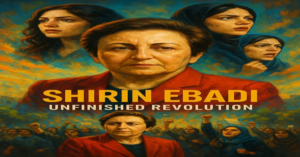Shirin Ebadi: The Unbroken Whisper Defying Iran’s Gender Apartheid (2024)
The Tea That Went Cold: Shirin Ebadi Unfinished Revolution

The tremor in her hands is barely noticeable as she pours the tea. Three sugar cubes—never two, never four—dissolving in amber liquid. Outside her London flat, rain smears the gray sky. But Shirin Ebadi isn’t seeing England. She’s seeing the cracked tile floor of her Tehran kitchen, the scent of saffron rice rising, her daughter’s laughter bouncing off walls that no longer belong to her.
“They took everything,” she says, not bitterly, but like a doctor stating symptoms. “Even my grandmother’s samovar. But they couldn’t take the cracks in their own lies.”
At 78, the first Muslim woman Nobel Peace laureate moves with the careful economy of someone preserving energy for battles only she can see. Her voice, when it comes, is softer than you’d expect—a murmur that somehow cuts through noise.
Shirin Ebadi : The First Time They Told Her “No”
Tehran, 1969
The dean’s office felt like an oven. Young Shirin, top of her law class, sat clutching her judgeship application. The dean avoided her eyes.
“The High Council feels… a woman’s nature is too compassionate for criminal court.”
Shirin leaned forward, her words precise as surgical stitches:
“Was Imam Ali not compassionate? Yet he judged justly. Or does compassion suddenly weaken the law when it lives in a woman’s body?”
Silence.
She got the robes.
Shirin Ebadi : The Kitchen Courtroom
1979 – The Revolution
Overnight, her judgeship vanished. “Emotionally unfit,” the notice read. Demoted to clerk, she’d watch male judges—some fresh from seminary, ignorant of civil codes—misrule from her old bench.
Her real court became her kitchen table.
Midnight. The scrape of a chair.
A woman with a bruised cheek whispers: “He took my sons. The judge said children belong to fathers.”
Shirin’s fingers trace Iran’s Civil Code.
“Article 1169,” she says. “Below age seven, mothers have custody. We’ll file at dawn.”
The woman weeps into cold tea.
This was her rebellion: turning kitchens into war rooms, arming terrified women with Article Numbers like bullets.
The Case That Cracked Her Open
1999 – Tehran Morgue
The small body lay under a sheet. Eleven-year-old Arian Golshani. 147 bruises mapped on her skin like a constellation of pain.
Shirin had fought for months to remove her from her stepfather’s “care.” The judge ruled: “Discipline is a father’s right.”
“I failed her,” Shirin tells me, her knuckles whitening around her cup. “That night, I tore up my speech for the Women’s Rights Convention. What rights? We couldn’t even save a child.”
Out of that despair grew Iran’s first law against child abuse (2002). Written in Arian’s blood.
The Nobel of Shirin Ebadi: A Poisoned Chalice
October 2003
The call came while she was bathing her granddaughter. “Nobel? Don’t be absurd,” she laughed. Then Oslo’s area code flashed.
Chaos. Reporters trampled her roses. State TV called it “an Islamic victory.” For three days, she dared hope.
Then the whispers: “Traitor… Western puppet…”
Stones shattered her windows.
“Gifts” arrived—a funeral shroud, a noose.
Her Nobel medal? Confiscated “for safeguarding.”
“In Iran,” she smiles grimly, “even gold fears the government.”
Exile: The Unhomed Heart
June 2009 – London
The phone rang at 3 AM. Her husband’s voice, thick with pain: “They broke in… took everything… your notes… Leila’s drawings…”
Her daughter’s childhood art. Gone.
She stood frozen in a rented flat, holding a suitcase meant for a three-day conference. She hasn’t touched Iranian soil since.
“Homelessness,” she murmurs, “isn’t lacking walls. It’s when your memories become contraband.”
The Scars She Carries

Look closer:
- The slight limp from Evin Prison’s damp concrete (incarcerated 1999, “for disturbing minds”)
- The way she touches her throat when tired—a reflex from the time interrogators squeezed her windpipe
- The framed photo on her desk: Zahra Kazemi, the Canadian-Iranian journalist beaten to death in custody. Shirin took her case. Lost. Took it again.
“They warned me,” she says simply. “I told them: ‘Then you’ll need to kill me twice.’”
Gender Apartheid: Shirin Ebadi
“When a court values my testimony at half a man’s—that’s apartheid.
When morality police murder Mahsa Amini—that’s apartheid.”
Her campaign isn’t semantics. It’s a legal grenade.
The Exile’s Paradox
Her London flat is spare :
- A chipped teacup from her mother
- A 1975 photo: Judge Ebadi, robes flowing
- A dried pansy : “From a girl in Evin. She hid it in her hijab.”
“We exiles are ghosts,” she says. “We haunt two worlds.”
Yet every morning, she logs onto Signal. Messages pour in:
- “My sister was arrested for no hijab—help?”
- “We recited your speech in the dormitory!”
Her rebellion: bearing witness.
Why She Still Hopes
February 2024
Shirin slides a phone across the table. Grainy footage: girls in Isfahan chanting “Woman, Life, Freedom!” Their scarves dangle defiantly from sticks like flags.
“See?” Her eyes glisten. Unbreakable girls.”
The Ritual
Every Friday, Shirin sets two teacups.
One for herself.
Other empty—“for Iran.”
She speaks to the silence:
“The baker in Shiraz gave free bread…
Flowers grew at Mahsa’s grave anyway…”
The Cost
Ask about regrets, and she’ll show you a 2004 photo: her husband and daughter, blurred in the background as she gives a speech.
“I chose the world’s children over mine,” she whispers.What mother does that?”
The silence hangs heavy. Outside, London rumbles on.
Then she lifts her chin: “Could I have looked at Arian’s mother? Or Zahra Kazemi?”
The Unbroken Thread
Shirin Ebadi’s power is in her relentless return.
After prison? She sued her jailers.
After exile? She became Iran’s global conscience.
“They misunderstand,” she says. “This isn’t defiance. It’s love. You don’t abandon family because they’re sick. You fight for their healing.”
As dusk stains her window, she picks up the phone. Another call. Another girl in trouble. The tea goes cold—again.
On the wall, her father’s words, framed in his handwriting:
“Justice is a seed.
Plant it in cracked earth.
Water it with tears.
Then wait.
Even stones cannot hold it back forever.”
In Tehran tonight, a young lawyer defends a woman arrested for dancing. She pins Shirin’s photo above her desk. She’s never met her. Doesn’t need to. The whisper travels through the cracks: “I am here. Keep going.”